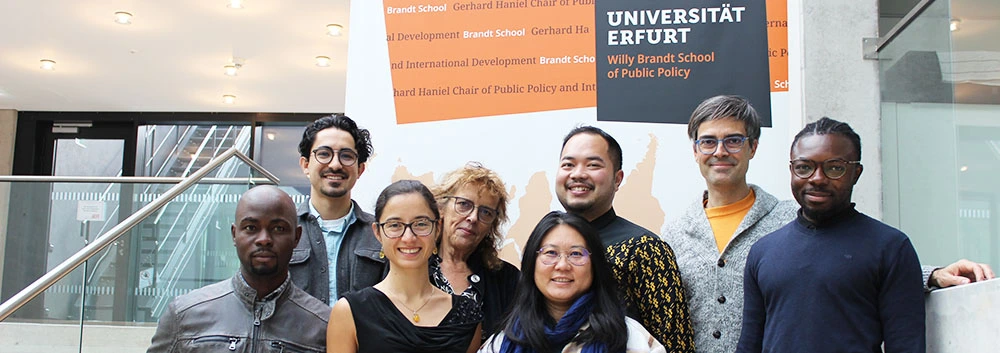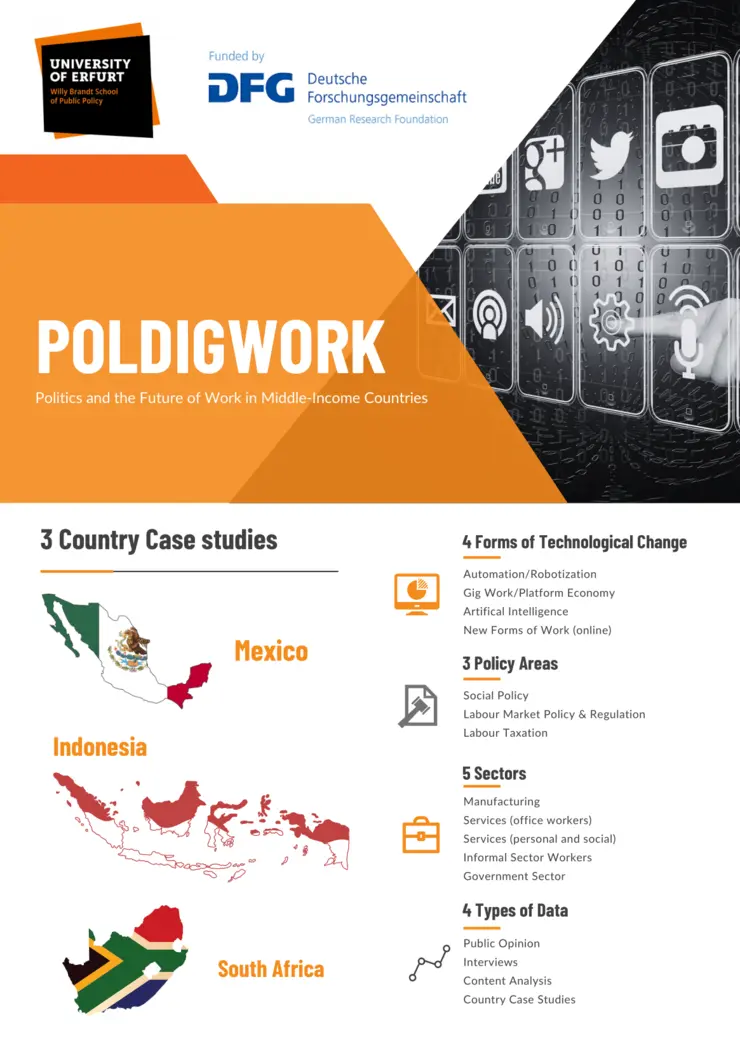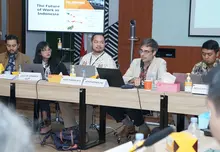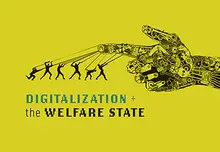Politics and the Future of Work in Middle-Income Countries (PolDigWork)
How Hopes and Fears about Digitalization Shape Opinions on Social and Labour Policies

Project description
In an era of rapid technological advancement, the digitalization of work has emerged as a pivotal force shaping economies and societies worldwide. New forms of digitalization and automation reshape how society 'works'. Innovations such as bots and robots change the nature of work and create new types of employment (e.g. gig work) and economic sectors. They also destroy existing jobs, automatizing tasks and making whole branches of the economy redundant. Social and political scientists begin to understand the processes and outcomes of this transformation in advanced industrialized countries. Especially for middle-income countries, however, we still know relatively little about the political consequences of the future of work. This research project delves into the exciting realm of digitalization and its profound impact on the future of work in Middle-Income Countries. Covering three different continents, the project will explore the impact of digitalization on the future of work, with a specific focus on a nested case study of Indonesia, South Africa and Mexico. We ask how key stakeholders and ordinary citizens see technological change. Are they afraid of negative consequences such as automation, or do they see technologies like AI rather as opportunities for work?
Research area: Development and Socio-Economic Policies
People
-
Vice Director (Willy Brandt School of Public Policy)Gerhard Haniel Professor for Public Policy and International Development (Willy Brandt School of Public Policy)
-
-
-
Doctoral Student (Willy Brandt School of Public Policy)
-
Output
Publications
- Awuni, E.T., & Kemmerling, A. (2023). Taking Gerschenkron to the Field: Attitudes toward Digitalization Hopes and Fears about the Future of Work in Ghana. Telecommunications Policy, 48(2), 102680.
- Awuni, E. T., Malerba, D., & Never, B. (2023). Understanding Vulnerability to Poverty, COVID-19’s Effects, and Implications for Social Protection: Insights from Ghana. Progress in Development Studies, 23(3), 246-274.
- Bokhari, H., & Awuni, E. T. (2023). Digital inequalities in North Africa: Examining employment and socioeconomic well-being in Morocco and Tunisia. Convergence, 30(3), 1149-1169.
- Kemmerling, A., & Makszin, K. (2023). Repackaging in South–North Policy Learning: The Chilean Model of Pension Reform as a Lopsided Exportschlager. Journal of Comparative Policy Analysis: Research and Practice, 25(5), 528–545.
- Kemmerling, A., Altamirano, M. & Rosales, Ma. S. (2023). THE FUTURE OF WORK IN MEXICO: Exploring Key Actors’ Perceptions on the Socio-Economic and Policy Implications of Workplace Transformations. With the Friedrich Ebert Stiftung. (Spanish version)
- Mwonzora, G. (2023). ‘Too many parties and still counting’: in defense of multiparty democracy in Zimbabwe. Politikon, 1-24.
- Mwonzora, G. (2023). ‘Who is patriotic, who is not’? Enactment of patriotism law in Zimbabwe. African Identities, 1-16.
- Fumagalli, M. & Kemmerling, A. (2022). Development aid and domestic regional inequality: the case of Myanmar. Eurasian Geography and Economics, 65(4), 486-515.
- Busemeyer, M., Kemmerling, A., Marx, P. & van Kersbergen, K. (2022). Digitalization and the welfare state. Oxford University Press.
- Iversen, T. & Rehm, P. (2022). Commissioned Book Review: Big Data and the Welfare State: How the Information Revolution Threatens Social Solidarity, Political Studies Review.
- Busemeyer, M., & Kemmerling, A. (2020). Dualization, stratification, liberalization, or what? An attempt to clarify the conceptual underpinnings of the dualization debate. Political Science Research and Methods, 8(2), 375-379.
- Kemmerling, A., Gast Zepeda, S. & Volkmann, S. (2020). On labour market impact of COVID-19.
- Kemmerling, A., Richter, S., & Robiatti, R. (Eds.) (2020). Populism and a new age of international fragility: seeking policy innovations 40 years after the Brandt Report. Erfurt: Willy Brandt School of Public Policy at the University of Erfurt.
- Duman, A. & Kemmerling, A. (2019). Do you feel like an insider? Job security and preferences for Flexibilization across Europe. Social Policy and Administration, 54(5), 749-764.
- Angeles, R. & Kemmerling, A. (2019). How redistributive institutions affect pay inequality and heterogeneity among top managers. Socio-Economic Review, 18(1), 3-30.
- Häusermann, S., Rueda, D. & Kemmerling, A. (2019): Special Issue on New Labour Market Divides in Political Science Research Methods 8(2)
Introduction: How Labor Market Inequality Transforms Mass Politics (with Silja Häusermann and David Rueda), pp. 344-355. - Berens, S., & Kemmerling, A. (2019). Labor Divides, Informality,and Regulation: The Public Opinion on Labor Law in Latin America. Journal of Politics in Latin America, 11(1), 23-48.
- Kemmerling, A., & Neugart, M. (2019). Redistributive pensions in the developing world. Review of Development Economics, 23(2), 702-726.
Blog Posts
Researchers under the PolDigWork project continue to translate academic and policy research into easy-to-read material for the general public.
“Ghanaians are optimistic that new digital technologies will improve their lives”
Here Evans Awuni and Gift Mwonzora, Research Fellows under the WBS dive deep into looking at how digital technologies are perceived by Ghanaians specifically looking at whether they feel these technologies are changing the future of work, or not: https://blogs.lse.ac.uk/africaatlse/2023/11/27/ghanaians-are-optimistic-that-new-digital-technologies-will-improve-their-lives/
“Digital elections no magic remedy for Zimbabwe's blighted democracy”
Gift Mwonzora explores the efficacy of digital technologies in elections but cautions against treating digitalising elections as the panacea to electoral malfeasance in African countries utilising the Zimbabwean case study. https://theloop.ecpr.eu/digital-elections-no-magic-remedy-for-zimbabwes-blighted-democracy/















